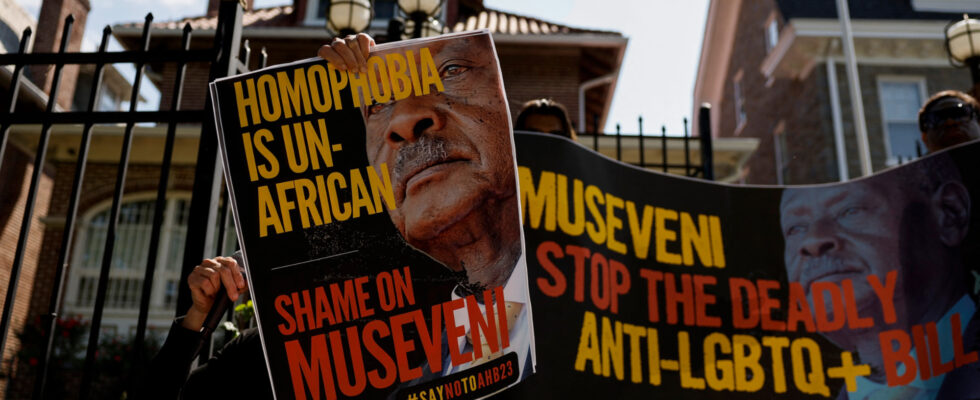The announcement of the promulgation of a new law providing for heavy penalties for homosexual relations and the “promotion” of homosexuality in Uganda arouses indignation and concern on Monday, from local NGOs to the White House. The Ugandan presidency announced that the head of state, Yoweri Museveni, had “approved” the text, which “now becomes the anti-homosexuality law 2023”. The news reignited fears sparked in March by the bill’s initial vote, which the head of the UN High Commissioner for Human Rights (OHCHR), Volker Türk, called at the time “discriminatory text – probably the worst in the world of its kind”.
The OHCHR said on Monday it was “appalled” to see this “draconian and discriminatory” bill come into force, “contrary to the Constitution and international treaties”, which opens the way to “systematic violations of the rights of LGBT people “. US President Joe Biden, denouncing a “tragic violation” of human rights, asked his services to study the consequences of this law on “all aspects of cooperation between the United States and Uganda”, in particular the aid and investments, according to a statement from the White House.
A law “contrary to human rights”
The deputy director for Africa of the NGO Human Rights Watch, Ashwanee Budoo-Scholtz, deplored a “discriminatory law” and “a step in the wrong direction”. Amnesty International has slammed “a deeply repressive law” which is “a serious attack on human rights”. The European Union, through the voice of the head of its diplomacy, Josep Borrell, considered “deplorable” this law “contrary to human rights”. “The Ugandan government has an obligation to protect all its citizens and uphold their fundamental rights. Failure to do so will undermine relations with international partners,” the diplomat added.
The signing into law of the Anti-Homosexuality Act by the Ugandan President Yoweri Museveni is deplorable.
This law is contrary to international human rights law and to Uganda’s obligations under the African Charter on Human and People’s Rights.#AUEU#Ugandahttps://t.co/4wVxQ8wSSR
— Josep Borrell Fontelles (@JosepBorrellF) May 29, 2023
Finally, London said it was “appalled” by this “deeply discriminatory” enactment. “This law undermines the constitutionally guaranteed protections and freedoms of all Ugandans,” said Andrew Mitchell, Secretary of State for Foreign Affairs. The text had been amended on the margins by the parliamentarians, at the request of President Museveni. The elected officials had notably specified that being homosexual was not a crime but that only sexual relations between people of the same sex were.
In this East African country where homosexuality is illegal, “acts of homosexuality” are punishable by life imprisonment since a law dating from British colonization. Parliamentarians maintained a provision making “aggravated homosexuality” a capital offence, meaning that repeat offenders could be sentenced to death. In Uganda, however, the death penalty has not been applied for years. An NGO has announced that it has seized the High Court of Uganda over this “blatantly unconstitutional” law. The criminalization of activity between consenting adult homosexuals “runs against key provisions of the Constitution, including the right to equality and non-discrimination”, ruled Adrian Jjuuko, executive director of the Human Rights Awareness and Promotion Forum. (HRAPF).
Fear of “popular justice” and “mass arrests”
A provision on the “promotion” of homosexuality is of particular concern to rights organisations. According to the text, anyone – individual or organization – “knowingly promotes homosexuality” faces up to 20 years in prison. If it is an organization, it risks a 10-year ban. “We feel so, so, so worried. This law is going to do a lot of harm to the LGBTQ community in Uganda,” the executive director of Sexual Minorities Uganda, a gay rights organization whose activities were suspended by the authorities last year. He fears “popular justice and mass arrests”.
This law also raises the concern of humanitarian organizations. “Uganda’s progress in its response to HIV is now severely compromised,” three aid organizations, including the Global Fund to Fight AIDS, Tuberculosis and Malaria and the US humanitarian agency USAID, said in a statement. The text “will hinder health education and awareness that can help end AIDS as a public health threat,” they warn.
“Protecting the sanctity of the family”
A Ugandan MP who initiated the text said on Monday that he expected sanctions from Western countries. “They are going to cut off aid to Uganda,” Asuman Basalirwa told the press, believing that new “development partners” had to be found, particularly in the Arab world. The President of Parliament, Anita Among, welcomed the promulgation of the text by Yoweri Museveni, who himself describes homosexuality as “deviance”. “As the Parliament of Uganda, we have heeded the concerns of our people and legislated to protect the sanctity of the family…We have stood firm in defending the culture, values and aspirations of our people,” she said in a statement.
This law enjoys broad popular support and opposition reactions have been rare in this country ruled with an iron fist since 1986 by Yoweri Museveni. Homophobia is widespread in Uganda, as in the rest of East Africa. While there have been no recent prosecutions for homosexual acts, harassment and intimidation are the daily life of homosexuals in Uganda, where an evangelical Christianity has developed that is vehement towards the LGBT+ movement.
